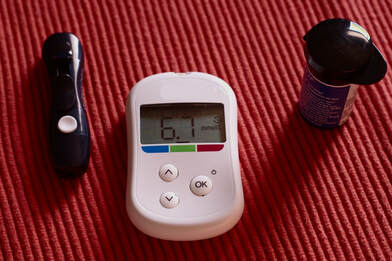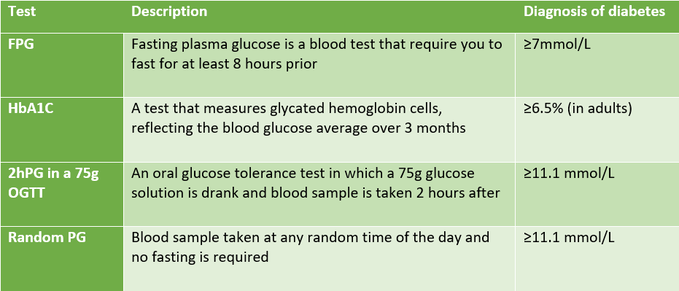If you have type 2 or prediabetes, or have recently been diagnosed, this page is for you! In this article, we will cover:
- What is diabetes?
- What are risk factors for diabetes?
- How to interpret your blood test results
- How you can manage diabetes
You may have been told by a family doctor that you have diabetes or prediabetes, and now you have to “watch your blood sugar”. Maybe they prescribed a medication, advised you to lose some weight, and do more exercise. Going on medication for life is a huge commitment and it can be overwhelming for so many people. On top of that, you might have to invest in a glucometer, test strips, and lancets to monitor your blood sugar at home. You want to manage with lifestyle interventions such as a healthy diet and exercise, but you don’t know where to start. You have so many questions: what causes diabetes? Can it be reversed? What happens if my blood sugar stays high? Do I have to cut out all sweets, fruits, bread and pasta?
Don’t sweat. It is hard news, but you’re not alone. Here’s the good news: if managed well, diabetes doesn’t have to affect your quality of life! And yes, you can still eat the foods you love while taking care of your health.
Don’t sweat. It is hard news, but you’re not alone. Here’s the good news: if managed well, diabetes doesn’t have to affect your quality of life! And yes, you can still eat the foods you love while taking care of your health.
What is diabetes?
In short, diabetes is when your body either doesn’t produce or doesn’t properly use the insulin it produces.
- Type 1 diabetes is the former, when your body doesn’t produce insulin at all and you need to depend on exogenous insulin. This is an autoimmune disease that affects about 10% of people with diabetes.
- Type 2 diabetes is by far the most common diagnosis and is the focus of this article. It is when your body is no longer sensitive to the insulin it produces.
- Prediabetes refers to impaired fasting glucose tolerance, indicated by a hemoglobin A1C of 6.0% to 6.4%. Having prediabetes does not mean that you will have type 2 diabetes. With proper management, type 2 diabetes can be prevented.
What causes diabetes?
|
Many of my patients with diabetes have asked, “What have I done wrong? I never eat a lot of sweets or drink pop.” I want to let you know, many of the risk factors for diabetes are really beyond your control. These include:
|
What tests can diagnose diabetes?
Several tests are used to diagnose diabetes. They are summarized in the table below.
How can I manage diabetes?
There are 4 main ways to manage blood glucose:
1. Diet
- The key to managing your blood glucose with nutrition is to eat regular meals at regular intervals throughout the day to maintain a steady level of blood sugar. Without insulin’s tight control of blood sugar, skipping meals or having a meal to large or small at varying time can cause unwanted fluctuations in your blood glucose levels.
- Choose slow carbs, not low carbs. After diagnosis, a lot of my clients started cutting out rice, bread, and pasta in fear of high blood glucose, when they really shouldn’t. Choosing “slow carb” means choosing more of low-glycemic index carbohydrates and less of high-glycemic index foods. The glycemic index is a measure of how fast your blood sugar rises after eating a certain food. A slow, stead rise helps your body respond to the carbohydrate load better.
|
2. Exercise
|
3. Medications
Depending on your blood work and health condition, your doctor may prescribe an oral diabetes medication to help manage your blood glucose. Another type of medication is insulin which is administered through an injection. Different oral medications and insulin have different mechanism, onset, and duration that treat diabetes.
4. Managing Stress
|
Stress is an inevitable part of life, especially if you have a chronic condition to manage while carrying out daily activities. Stress can affect your blood sugar as well. If you experience a lot of stress, have a plan on things you can do to manage stress levels. What would bring you joy? Who can you talk to? Remember, you’re not alone on this journey. The people around you would love to help if you let them know how. Consider seeking support from a professional who can walk with you through these challenges.
|






